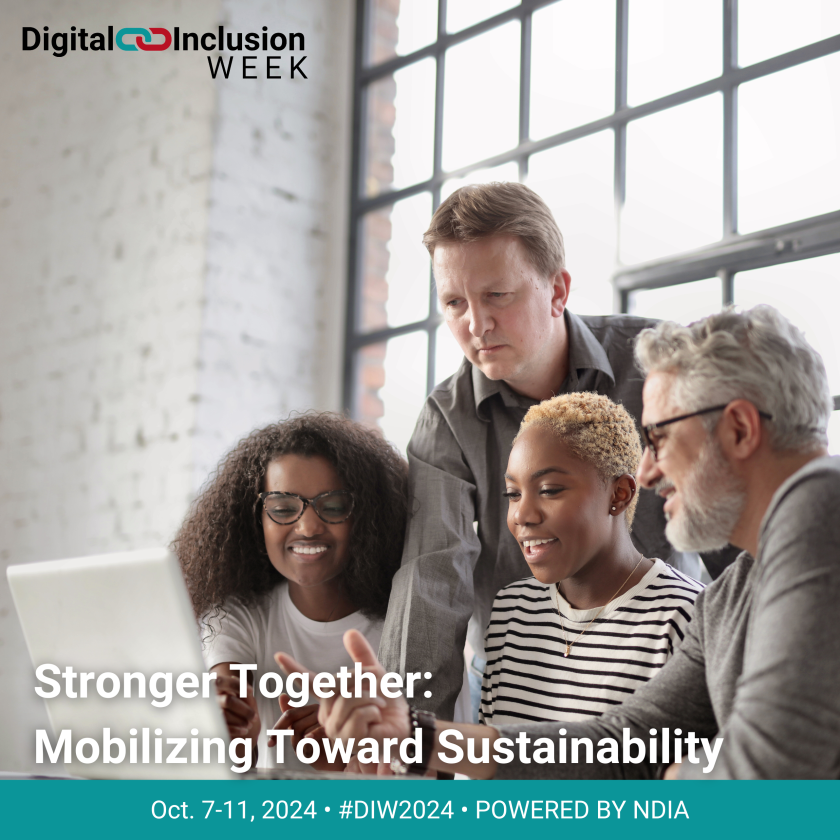- Digital Inclusion Week 2024
- Broadband Legislation Passes in Senate
- More BEAD Funding Proposals Approved
- Multilingual Application for Low-Cost Internet in Seattle
- County Coalition Holds First In-Person Meeting
- Beeck Center Funds to Support Digital Service Delivery
DIGITAL INCLUSION WEEK 2024

Credit: National Digital Inclusion Alliance
DIW, taking place from Oct. 7-11, is empowered by the National Digital Inclusion Alliance (NDIA). NDIA supports organizations and individuals as they hold events, run campaigns and share success stories with the public.
The theme this year, “Stronger Together: Mobilizing Towards Sustainability,” aims to emphasize collaboration in digital equity.
Last year marked the biggest DIW yet, with 687 people and 503 organizations participating. In 2022, DIW also broke its own participation record. NDIA expects DIW to have an even bigger impact this year.
NDIA is spreading awareness of the events happening next week, with a table and map. The map shows where events are taking place across the U.S., and the table offers information on the types of events and whether people may attend via livestream.
People who would like to participate in DIW can share the actions they or their organization plan to take by filling out the NDIA form.
For those who are new to participating, NDIA has several helpful resources to support planning efforts, including an informational video session addressing everything from building leadership buy-in to establishing partnerships and acquiring funding.
The organization is also offering a range of other resources: an event toolkit, an email outreach template for elected officials, customizable graphic templates for social media, and a press release template. NDIA wants to make it easier for more people to get involved in this initiative.
NDIA has information on its website about past DIWs dating to 2017, when the series launched to bring momentum to the country’s digital equity work.
Separately, NDIA is calling for those involved in digital equity coalitions to complete a surveyby Nov. 15, to help it learn about the collaborative landscape. Findings will be shared on NDIA's digital equity coalition web page.
BROADBAND LEGISLATION PASSES IN SENATE
The Rural Broadband Protection Act cleared the U.S. Senate by unanimous vote last week. The legislation now heads to the U.S. House of Representatives.
The bill would require more thorough vetting for Internet service providers that want to participate in the Federal Communications Commission’s high-cost program, which provides funding to telecom carriers to expand service availability in rural areas where it may be more expensive to deploy.
“West Virginians keep their word, and it’s time Internet service providers do the same,” U.S. Senator Shelley Moore Capito said in a statement.
In other legislative digital equity news, last week the U.S. House passed legislation related to 6G technology.
MORE BEAD FUNDING PROPOSALS APPROVED
At the state level, several new states have received an approval on their initial proposals for Broadband Equity, Access and Deployment (BEAD) Program funding this week.
As of Thursday morning, Arkansas, Georgia, Iowa, Minnesota and South Carolina join the growing list of states that have had their proposals approved. The states will receive funding up to the amount they were allocated. For these states, that amount is more than $1 billion, $1.3 billion, $415 million, $651 million, and $551 million, respectively.
MULTILINGUAL APPLICATION FOR LOW-COST INTERNET IN SEATTLE
In local news, the city of Seattle has announced the availability of a low-cost Internet service option; notably, residents can now apply for this service on their preferred device and in their preferred language using CiviForm.
Enabling access to this service was a joint effort across the city’s IT team involving collaboration between the Affordable Seattle team and the digital equity team.
Prior to the launch on CiviForm, applications for this service had to be completed on paper, with only one language option — where now there are eight. Now, after applying for low-cost Internet, the system saves residents’ information, making it easier to apply to eight other city programs that can help with things like child care and transportation.
COUNTY COALITION HOLDS FIRST IN-PERSON MEETING
In other local news, Illinois’ Lake County Digital Equity Coalition held its first in-person meeting last month. At the gathering, community organizations, residents and other stakeholders discussed concrete steps to help mitigate the county’s digital divide.
Organization members gave presentations, including introducing the Lake County Digital Navigator Program, a model of training community leaders to offer digital skills support in their communities. To make the meeting more inclusive, in-person Spanish translation services were available via support from the Job Center of Lake County and the Digital Equity Coalition.
The next meeting will be a virtual one, set for Oct. 29. Get more information on participating here.
BEECK CENTER FUNDS TO SUPPORT DIGITAL SERVICE DELIVERY
The Beeck Center for Social Impact and Innovation at Georgetown University has received $8 million from the Ballmer Group to support its work in expanding digital service and benefits delivery across all levels of government.
The organization works with state, local, territorial and federal governments to help them implement digital tools, online forms and secure data practices to ensure residents can access services and benefits.
The gift will support the organization’s work “in making government services more accessible and equitable for those who need them most,” Beeck Center Executive Director Lynn Overmann said in a statement.









